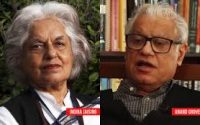Who is Tassaduq Hussain Jillani? Pakistan judge was lone dissenting voice in 15:1 Kulbhushan Jadhav verdict
Source: firstpost.com
The International Court of Justice (ICJ) voted 15-1 in favour of India in the Kulbhushan Jadhav case and suspended the death sentence by Pakistan against the former navy officer. Pakistan’sad hoc judge Tassaduq Hussain Jillani was the only judge who voted against the verdict.
In 2017, Pakistan appointed Jillani, former chief justice, as an ad hoc judge to represent the nation in the Jadhav case. Under ICJ rules, “a State party to a case before the ICJ which does not have a judge of its nationality on the bench may choose a person to sit as an ad hoc judge in that specific case”.
While ICJ found Pakistan guilty of violating the Vienna Convention that provides a framework for consular relations between countries, Jillani in his dissent note was quoted as saying by the Pakistani media that the convention was not applicable to spies, according to Pakistani newspaper Jang. The verdict, directing Pakistan to stay the execution of Jadhav and allow him consular access, can be seen as a victory for India.
Jillani served as Chief Justice of Pakistan from 11 December, 2013 to 5 July, 2014. Having worked as a Judge of the Lahore High Court from 1994 to 2004, Jillani was elevated to the Supreme Court of Pakistan in July 2004.
On completing his schooling from Multan, he moved to the Forman Christians College, Lahore, where he completed his graduation and obtained a Master’s degree in political science. He started his professional career as a lawyer from the Districts Courts Multan and in a short span of less than 10 years, was enrolled as an advocate of the high court and Supreme Court.
Hailed as an independent and balanced judge, he has authored judgments on various pertinent issues of international and domestic concern such as enforcement of fundamental rights, gender equality, the right of an adult woman to marry a person of her choice in Islam, declaring the right to education a fundamental right and holding that in an age of globalized inter-dependence, dual nationality should be permitted. He has also emphasized the need for qualitative improvement in Pakistan’s legal and medical education.
Jillani has numerous global awards to his name. He received the ‘2008 Rule of Law Award’ by the American Bar Association. The Hague Conference has appointed him as the Co-Chair of the Working Party on Mediation in Family International Law. In 2011, he was conferred the Distinguished Formanite Award by the Forman Christians College University, Lahore. He was invited by the University of California San Diego School of Global Policy and Strategy in 2017 where he delivered a public talk on “maintaining judicial independence in the face of political challenges”.
An avid enthusiast of poetry, antiques and classical films, Jillani is credited for writing Justice for All, the theme song sung at the 50th Anniversary of the Supreme Court of Pakistan. The song has been declared as the Judicial Anthem of Pakistan by former Chief Justice Iftikhar Chaudhry.
Related Posts

Sudhir Krishnaswamy takes charge as NLSIU’s vice-chancellor

Law Ministry to launch cohesive insurance scheme for lawyers

